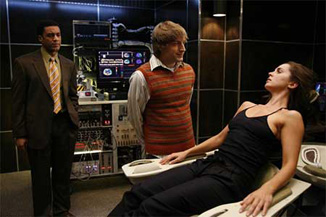Mythology
By Martin Felipe
April 22, 2009
BoxOfficeProphets.com

I know I had some more Desmond thoughts to go into, and I will go into them, but we're getting to that critical time where networks are axe swinging, and I want to get one more plug in for a new mythology show that sits on the edge of cancellation before it's too late: Dollhouse.
One of the big names in recent serialized television mythology shows is Joss Whedon. We've all seen the checklist of qualities that make a Whedon offering so special, but one thing at which he excels is exploring the many philosophical possibilities on a theme.
You see, this is where I argue that, if done well, the televised serial can exceed the potential of feature film. Take Watchmen, for example. The Dr. Manhattan character's consciousness resides outside of our linear concept of time. It exists in all times simultaneously. A complex idea, but suffice it to say, he sees the future. But if he knows what must happen, and what all our actions will be before we make them, how can anyone have free will? It's a fascinating question that Snyder can only touch upon in the limited time a feature film's running length allots. Contrast that with the "whatever happens happens" theme of recent Lost. Given weeks to explore the idea, Lindelof and Cuse are better able to address the significance of a deterministic timeline.
The entire concept of Dollhouse is a philosophical quandary. By now, I assume we've all heard the story, but here it is. The Dollhouse is an underground organization, imprinting personalities upon blank slate operatives, and sell their services to wealthy clients. Come to think of it, it's not too different of a theme than the one I describe above, that of the nature of free will.
Now, like Buffy the Vampire Slayer and Angel before it, Dollhouse takes a few weeks to get the ball rolling. It's a somewhat challenging premise, what with our lead (Eliza Dushku) being a blank slate and changing personalities from week to week, so Whedon takes time to establish the world. There's also a lot of talk about network interference with the show. Whedon is known for complex, long term story arcs, buried within weekly adventures, and networks really prefer the episodic approach. It allows viewers to pop in and out, while ongoing stories require faithful viewing and alienate newcomers. As a result, the first five episodes really lack the dramatic weight that Whedon fans have come to expect of his work.
Then, six episodes in, Whedon turns up the heat. I don't know if it's part of his natural show design, or if he just said "bite me" to Fox and started to do what he does best, but, not only does the show's narrative become more complex, but the free will theme kicks into high gear.
Two of the characters, Harry Lennix's Boyd Langton and Tamoh Penikett's Paul Ballard, have represented the anti-Dollhouse point of view. Langton, a Dollhouse employee, questions the morality of the organization, and Ballard, an FBI agent, investigates it in order to bring it down. The famous episode six introduces a character portrayed by Patton Oswalt who presents a very compelling argument for the existence of such a service. Episode eight explored how the dolls would react were they to awake and discover their situation. And the most recent episode shows Ballard's reaction to the discovery that one of his most trusted friends is, in fact, a doll, and that their entire relationship is a fabrication.
Dollhouse is no Buffy The Vampire Slayer. Then again, ten episodes in, Buffy wasn't Buffy yet either. Look, I'm not saying that we shouldn't have our episodic procedurals like House and CSI. They're well made shows, and I understand their value to television's bottom line. But a show like Dollhouse has untapped and untold potential for television's artistic possibilities. Give it a shot. Let's see if we can squeeze a second season out of Fox. I have faith in Whedon. He'll continue to explore the complex thematic and storytelling possibilities of another of his distinct universes.